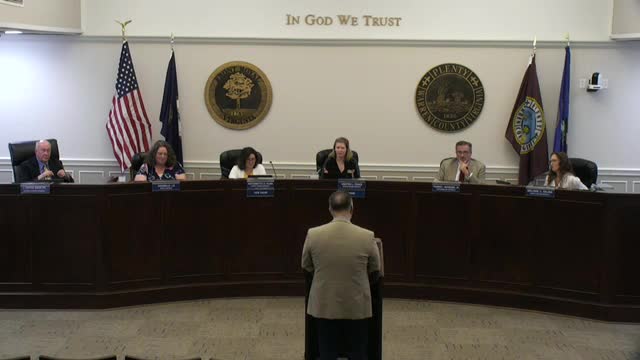Warren County School Board seeks talks with supervisors to protect meals-tax revenue for school maintenance
October 01, 2025 | WARREN CO PBLC SCHS, School Districts, Virginia
This article was created by AI summarizing key points discussed. AI makes mistakes, so for full details and context, please refer to the video of the full meeting. Please report any errors so we can fix them. Report an error »

The Warren County School Board on Oct. 1 adopted a resolution asking the Warren County Board of Supervisors to open talks on using meals‑tax revenue to fund long‑term upkeep of school facilities.
The request follows presentations by Dr. Costner, who reviewed the history of the meals tax ballot language and subsequent county/town agreements that changed how collections were distributed. Costner told the board the county is currently covering debt service tied to school construction and that the existing memorandum of agreement provides the town with 30% of corridor meals‑tax receipts, reducing the share available to the school division.
The resolution the board approved notes the board of supervisors has funded debt service for new school construction and says the school board seeks a “constructive dialogue” to develop a plan that secures funding to preserve school buildings. Board members described widespread maintenance needs — from roofs to courts — and framed the conversation as an early step toward identifying predictable funding for capital upkeep rather than an immediate dollar request.
Dr. Costner provided figures the board used in discussion: he said debt service covered by the county is $10,990,343; he also reported the meals‑tax collections for the July 1–June 30 2023–24 period and the memorandum of agreement remittances, saying that roughly $1,139,833 was collected and that about 30% (approximately $341,950) was remitted to the town under the county’s agreement, leaving roughly $792,905 applied toward debt service in that period. Board members and staff repeatedly stressed that the county’s existing 30% allocation is already committed and that any new support likely would require “new money” or a change in how proceeds are earmarked.
Board members proposed several next steps: using upcoming joint budget work sessions to raise the issue with supervisors, exploring carryover or audit balances, and considering a formal cost‑sharing or earmark mechanism so maintenance funds would be held separately for school facility needs. After discussion, the board voted to accept the resolution and to forward the request to the supervisors for further conversation.
The motion to adopt the resolution was made and seconded on voice vote; the chair called for the ayes and none opposed. The resolution does not itself change how revenues are distributed; it asks the supervisors to meet and negotiate possible changes or protections for meals‑tax proceeds going toward school upkeep.
The board’s request does not set specific new funding commitments and does not alter the memorandum of agreement between the county and town; instead it asks for a formal negotiation so the parties can plan longer‑term maintenance funding.
The school board indicated they intend to use the board supervisors’ upcoming joint work sessions during budget development as an early forum for those discussions.
The request follows presentations by Dr. Costner, who reviewed the history of the meals tax ballot language and subsequent county/town agreements that changed how collections were distributed. Costner told the board the county is currently covering debt service tied to school construction and that the existing memorandum of agreement provides the town with 30% of corridor meals‑tax receipts, reducing the share available to the school division.
The resolution the board approved notes the board of supervisors has funded debt service for new school construction and says the school board seeks a “constructive dialogue” to develop a plan that secures funding to preserve school buildings. Board members described widespread maintenance needs — from roofs to courts — and framed the conversation as an early step toward identifying predictable funding for capital upkeep rather than an immediate dollar request.
Dr. Costner provided figures the board used in discussion: he said debt service covered by the county is $10,990,343; he also reported the meals‑tax collections for the July 1–June 30 2023–24 period and the memorandum of agreement remittances, saying that roughly $1,139,833 was collected and that about 30% (approximately $341,950) was remitted to the town under the county’s agreement, leaving roughly $792,905 applied toward debt service in that period. Board members and staff repeatedly stressed that the county’s existing 30% allocation is already committed and that any new support likely would require “new money” or a change in how proceeds are earmarked.
Board members proposed several next steps: using upcoming joint budget work sessions to raise the issue with supervisors, exploring carryover or audit balances, and considering a formal cost‑sharing or earmark mechanism so maintenance funds would be held separately for school facility needs. After discussion, the board voted to accept the resolution and to forward the request to the supervisors for further conversation.
The motion to adopt the resolution was made and seconded on voice vote; the chair called for the ayes and none opposed. The resolution does not itself change how revenues are distributed; it asks the supervisors to meet and negotiate possible changes or protections for meals‑tax proceeds going toward school upkeep.
The board’s request does not set specific new funding commitments and does not alter the memorandum of agreement between the county and town; instead it asks for a formal negotiation so the parties can plan longer‑term maintenance funding.
The school board indicated they intend to use the board supervisors’ upcoming joint work sessions during budget development as an early forum for those discussions.
View full meeting
This article is based on a recent meeting—watch the full video and explore the complete transcript for deeper insights into the discussion.
View full meeting
